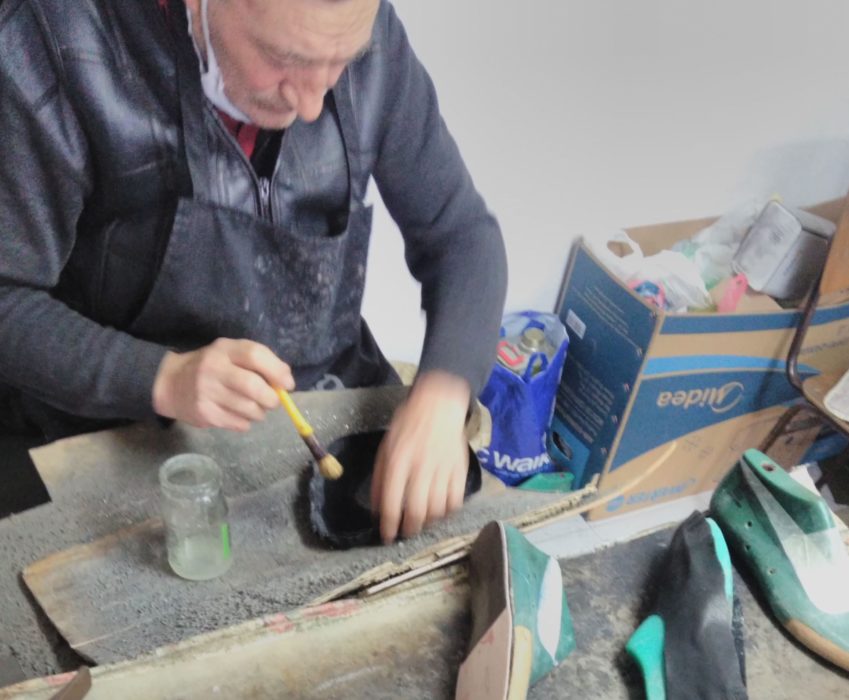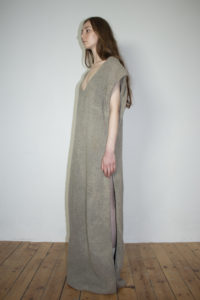21st May 2021 Skopje, North Macedonia
The Case of Sustainability in Macedonian Fashion

INTRODUCTION
Times are changing, fast and unexpectedly. Societies shift as historic events unravel rapidly before the eyes of the world. As consumer needs change, fashion has to keep pace and reflect these social and economic transformations.
At least when asked, 88% of consumers now want fashion that stands for the environment as awareness about its detrimental impact on climate change has risen in recent years. Fast fashion is replaced by sustainable fashion and in this industry everybody is quick to follow suit and claim their ethical and sustainable practices. If the claims were true we’re on the verge of a revolution that will no longer label fashion industry as one of the biggest polluters.
But the difference between “preaching” and practicing is a well-known fact, both for consumers and industry insiders.
And where does Macedonian fashion industry stand today? Is it sustainable in any way?
MACEDONIAN FASHION: TEXTILE FACTORIES vs. FASHION DESIGNERS
Unlike its heyday in ‘70s socialist Yugoslavia the textile industry is in a bad shape. The Macedonian garment production facilities are an alternative to the Asian cheap labour and rely on substantial orders from European brands. Over a thousand factories in North Macedonia, most of which are located solely in the small town of Stip, are working in substandard conditions undermining workers’ rights and employing untrained staff to meet the cheap prices set up by the contractors. They also produce mass-market priced clothes for their own stores in North Macedonia, which is a small share in their whole annual income, often selling out these collections in extended seasonal terms and below a significant mark up.
And these privately owned productions amounting up to 12% of the national GDP are not touched in any way by the recent global development towards sustainability. No one seems to mind the fact that Macedonian workers accept jobs in these factories below the legal minimum wage and work in highly unethical conditions.
Moving up the country to the capital of Skopje, you can find a glamourous fashion scene in Skopje, perpetuated mainly by wealthy womenswear designers. And the discrepancy from the textile industry factories is more than evident.
Macedonian designers have quickly adopted the sustainable vocabulary in their marketing communications and whether it is real or a selling tool, it does not matter as their production is very limited, handmade and on-demand.
The possibility to scale their commission-based business model has been obstructed by the fact that they are so different from what a Macedonian textile factory is technically equipped to produce. And that is completely opposite of what the designers’ product is – a high-end garment.
The pandemic of COVID-19 has urged many designers based in Skopje to produce mass-marketed clothes, lower their price points in an attempt to mirror the demands of an eventless lifestyle of their target clientele. And they’ve found no problem in producing it locally at very cheap rates. The problem is that now they are no longer sustainable or ethical.
SUSTAINABILITY AND FASHION DESIGNERS IN NORTH MACEDONIA
Fashion designers in North Macedonia diverse in their aesthetics, experience, product and business model constitute a fashion scene close to the client and fashion devotees. The dominant business model is on-demand as designers tend to set up a small studio or shop with a few well trained employees, working mainly on commissions even though their prominent marketing is fashion shows and small ready-to-wear collections.
There is also a growing number of small, one-to-two person owned brands that operate a direct-to-consumer business model with local and international clients.
And all of these business models are sustainable, with their use of dead stock fabrics, leftovers from the factories, slow and limited production of clothes and ethical treatment of seamstresses and tailors.
I’ve started using exclusively 100% natural fabrics for my agender label Ludus in 2015 when sustainability was a very new issue in fashion and seeing young designers committing to using only natural fabrics nowadays makes me think we’ve set up a very good example.
I’ve also been following closely local fashion designers since my eponymous concept store in Skopje and have to admit that only an organized and collective effort can contribute to a better fashion industry. So I have created Slowscapes, a showroom for Macedonian fashion and design that unites a growing number of fashion, jewellery and accessories designers who work sustainably and care for the environment.
SUSTAINABLE PRACTICES IN THE MACEDONIAN CRAFTS HERITAGE
Where can the sustainability expand in the work of the Macedonian fashion designers? What sustainable practices can be implemented in their works that are typical of North Macedonia?
My personal opinion has always been that Macedonian designer should look for their unique point of view in Macedonian crafts heritage. A numerous list of handcrafts has been in decline ever since the industrialization, but their revival and transformation into contemporary handmade products with high-end value could hold a key to a successful and truly unique business. The use of the local craftsmanship and the employment of local and high-quality artisanal productions into an already established fashion business could be a sustainable practice with numerous future possibilities.
Another sustainable practice indigenous to our country is hand-knitting. It is by far the most sustainable practice as it is waste free and is easily up-knitted into a new product or completely recycled.
As there are only a few knitwear brands in North Macedonia, I personally urge designers to explore and ask for local producers of wool, wool spunners, look for skilled knitters and expand their knowledge of many traditional artisanal techniques outside the schemed fashion operations and continue their formation process.
CONCLUSION
The future could hold an array of new sustainable practices that could be born from the local skills and forgotten traditional techniques, never disregarding newly formed consumer needs. As the fashion designers capacity and production volume will stay limited, it should be highly controlled and transparent in order to gain trust by the clients and not deceive them.
At any given chance I will always use my voice to address the sustainability issues away from the young designer and start-ups and point it directly towards the biggest mass-market clothing producers, wealthier Macedonian brands who care for profit and turn their back to the basic needs of their workers and contribute to irrevocable destruction of our planet. Even more, globally, I point my finger to the luxury fashion groups and high street brand and ask for ethics and transparency in their work.
Note: British Embassy Skopje offers its blog platform for guest posts. The views expressed in the guest posts are those of the authors.
